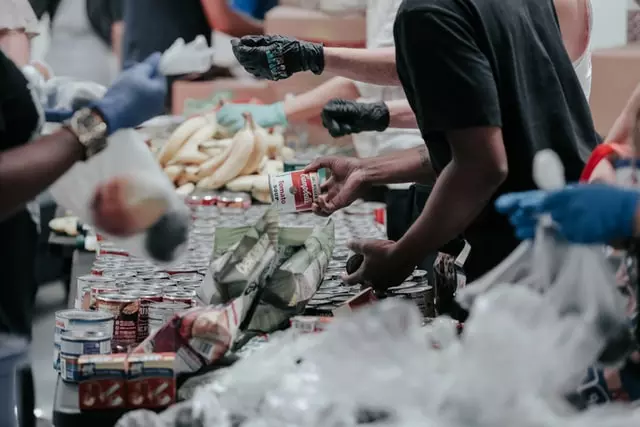Food banks are proving to be a basic need in the UK since society is fractured due to various reasons. Initially, these food giving outlets were reserved for those groups of people who were most vulnerable in society and would fail to fend for their families. Other families who had individuals going to work could put food on their tables and manage to care for their families. But it seems like things have changed for the worse as many Britons are struggling to make ends meet, and their financial situation is pretty bad.

A survey showed that many people visit Dad’s House, a bicycle shop, and a coffee house that charges no money and is established to serve poor people. The UK has about 2 200 food banks that cater for all struggling masses who cannot afford basic needs. The founder of Dad’s House, Billy McGranaghan (58), was interviewed by CNN and said that “the future is bleak” for all those coming to their facility.
Before the outbreak of the coronavirus pandemic, food banks were functioning at a reasonable scale because the number of people seeking food assistance was low compared to the current levels. Amid the intense period of the pandemic, studies showed that the inequality between the poor and the rich increased significantly, which entails a surge in the number of poor people. Inflation levels also increased while food prices were hiked and essential services became too expensive for low-income earning families. Because of these covid-19’s effects, various people were plunged into poverty and children headed families suffered the most.
This prompted poor persons to hunt for food banks to survive. It was noted that “Food banks in the capital city have reported a surge of visits in recent weeks, with more and more working professionals seeking help with groceries following the end of a government program that subsidized millions of jobs during the pandemic and a reduction in welfare payments to those with lower incomes” [Source].
The demography of people using food banks is diverse, and McGranaghan added around 78 to his 400 recipients in his record book since mid-September. All those new recipients came to the food bank after getting referrals from the local government or searching online while looking for food aid. These people are being served weekly, with most of them solely depending on their food. “It’s been an eye-opener, where you would never have thought that person would ever use a food bank, and they’ve never been in that position,” noted Dad’s House founder.
According to McGranaghan, poverty is now a real threat because his food bank serves teachers, graphic designers and journalists in this coronavirus era. These are people who have a viable profession, but it seems as if they are not working. New clients are now young and single instead of having older adults, parents with children and large families. This shows that the problem is a web involving all age groups, and job losses and economic meltdown necessitated this during lockdowns.
Because of the projected rise in covid-19 infections due to winter conditions, McGranaghan posited that their clients might increase in the next few months. “We’re seeing a rise again … because of the electricity prices, because of the gas, because of the end of the furlough,” he said.
Robert Hunnighee (42), who facilitates Humdingers, a food bank, said the number of attendees at his bank “skyrocketed” by up to 250 per week in September. He also shared the same sentiments of serving’ young professionals, school teachers and semi-pro tennis players. “Even if you have a job, there’s no hope because you can’t afford to live here. Everything is out of arm’s reach and then the prices are going up so much”.
Gary Lemon, director of policy and research at The Trussell Trust, an organization that distributes groceries to two-thirds of the UK’s food banks, said their officials were “very busy with more people needing to come to them for emergency food”. He added that “They expect this to continue in the weeks leading up to Christmas”. “If you look at what’s happened over the last seven months, the queues have got significantly longer, the nature of the guests who are queuing up … it’s changed to families as well as those who were living on the streets,” noted Alexander Shahid Khan, a banker who volunteers at a food bank in London. He added that “So you can see that the effects of COVID have meant there’s a lot of people suffering from income and food poverty at the moment”.
Fuel costs, inflation, electricity bills, medical services, food, suspension of government grants and certain stimulus checks all contributed to the financial turmoil of Britons. This leads to many people’s need for assistance from food banks, and the Trussell Trust must ensure these food banks’ longevity to cater to the masses.





































